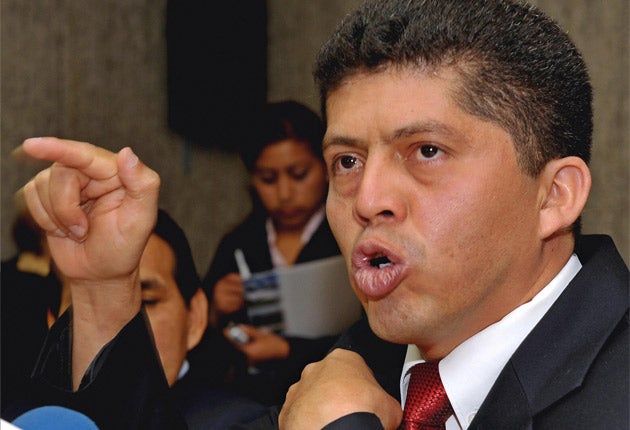Lawyer who toiled in the oil fields as a child

Your support helps us to tell the story
From reproductive rights to climate change to Big Tech, The Independent is on the ground when the story is developing. Whether it's investigating the financials of Elon Musk's pro-Trump PAC or producing our latest documentary, 'The A Word', which shines a light on the American women fighting for reproductive rights, we know how important it is to parse out the facts from the messaging.
At such a critical moment in US history, we need reporters on the ground. Your donation allows us to keep sending journalists to speak to both sides of the story.
The Independent is trusted by Americans across the entire political spectrum. And unlike many other quality news outlets, we choose not to lock Americans out of our reporting and analysis with paywalls. We believe quality journalism should be available to everyone, paid for by those who can afford it.
Your support makes all the difference.Pablo Fajardo knows a thing or two about the ways of the oil companies he battled in court – from the age of 14, the lawyer from a desperately poor family toiled in the oil fields himself, struggling on paltry wages to provide for his younger siblings.
It was only through determination and a fierce indignation at what he saw as the exploitation of indigenous people by foreign companies that the earnest 38-year-old fought his way through night school and found himself representing the 30,000 Ecuadorians taking on the oil giant Chevron.
After a court this week awarded them $8.6bn in damages, Mr Fajardo was characteristically humble, telling the Associated Press that the judgment was "a great step that we have made toward the crystallisation of justice" but adding that they were "not completely satisfied" and were considering an appeal.
Mr Fajardo was born in 1972 into a peasant family with indigenous heritage. Moving around the country to follow the work, they eventually arrived in the town of Shushufindi near Lago Agrio, where the teenager began working in the rough area dominated by Texaco's operation to tap the vast oil reserves flowing beneath the Amazon.
During the day he would hack through the thick jungle, clearing land or cleaning pipelines in the oilfields, attending school by night. The teenager was shocked at the contrast between the North American contractors' life of comfort and the local workers who struggled without electricity, and aged just 17, Mr Fajardo helped set up a human rights organisation. As the years passed, people started looking to him for leadership, and encouraged by a local priest and funded by friends, Mr Fajardo eventually put himself through law school, rising every day at 3.30am to study before heading to the jobs he maintained to support his family.
He finally qualified in 2004 and agreed to be the lead attorney for the plaintiffs in Lago Agrio. In 2007, CNN named him one of its heroes of the year. A profile in Vanity Fair the same year painted the picture of a champion of the poor up against an army of corporate lawyers, sleeping in his office and cycling to court.
"I realised that I was not inferior to the Chevron lawyers," he told the magazine. "In fact I had one advantage over them: I know the problems as they really are, because I live here. I have lived here for more than half my life. I realised that if I took the case all I would have to think about is how to tell the truth."
Join our commenting forum
Join thought-provoking conversations, follow other Independent readers and see their replies
Comments